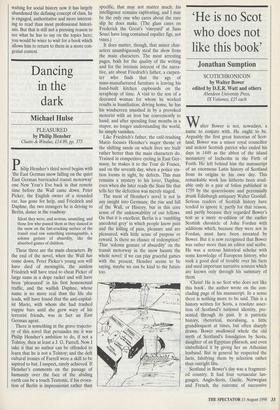Dancing in the dark
Michael Hulse
PLEASURED by Philip Hensher Chatto & Windus, £14.99, pp. 373 Philip Hensher's third novel begins with `the East German snow falling on the quiet East German barricaded transit motorway' one New Year's Eve back in that remote time before the Wall came down. Peter Picker, the English owner of a stranded car, has gone for help, and Friedrich and Daphne, the two strangers he is driving to Berlin, dance in the roadway:
Silent they were, and serious, unsmiling; and those few who passed them as they danced in the snow on the fast-cracking surface of the transit road saw something unimaginable, a solemn gesture of absurdity, like the absorbed games of children.
These three are the main characters. By the end of the novel, when the Wall has come down, Peter Picker's young son will have died of meningitis, the aimless Friedrich will have tried to cheat Picker of large sums in a dope racket and will have been 'pleasured' in his first homosexual traffic, and the waifish Daphne, whose name is no more real than the life she leads, will have found that the anti-capital- ist Mario, with whom she had trashed yuppie bars until she grew wary of his terrorist friends, was in fact an East German agent.
There is something in the grave trajecto- ry of this novel that persuades me it was Philip Hensher's ambition to do, if not a Tolstoy, then at least a J. G. Farrell. Now I take it that no author can be offended to learn that he is not a Tolstoy; and the deft cultural ironies of Farrell were a skill to be aspired to but, I suspect, rarely achieved. If Hensher's comments on the passage of humanity over the face of the abiding earth can be a touch Teutonic, if his evoca- tion of Berlin is impressionist rather than specific, that may not matter much: his intelligence remains captivating, and I may be the only one who cares about the rare slip he does make. (The glass cases on Frederick the Great's 'vineyard' at Sans Souci have long contained espalier figs, not vines.) It does matter, though, that minor char- acters unambiguously steal the show from the main characters. The most arresting pages, bath for the quality of the writing and for the intrinsic interest of the narra- tive, are about Friedrich's father, a carpen- ter who finds that the age of mass-manufactured furniture is leaving his hand-built kitchen cupboards on the scrapheap of time. A visit to the son of a deceased woman for whom he worked results in humiliation; driving home, he has his windscreen smashed in by a provoked motorist with an iron bar conveniently to hand; and after spending four months in a stupor, no longer understanding the world, he simply vanishes.
Like Friedrich's father, the café-trashing Mario focuses Hensher's major theme of the shifting sands on which lives are built rather better than the main characters do. Trained in competitive cycling in East Ger- many, he makes it to the Tour de France, and on the seventh day, when a police sta- tion looms in sight, he defects. This man remains a mystery to his lover, Daphne, even when she later reads the Stasi file that tells her the defection was merely staged.
The meat of Hensher's novel is not in any insight into Germany, the rise and fall of the Wall, or History, but in this core sense of the unknowability of our fellows. On that it is excellent. Berlin is a 'rumbling anecdotal grey' in which people know pain and the killing of pain, pleasure and are pleasured, with little sense of purpose or reward. Is there no chance of redemption? That 'solemn gesture of absurdity' on the transit motorway in the snow haunts the whole novel: if we can play graceful games with the present, Hensher seems to be saying, maybe we can be kind to the future too.


























































 Previous page
Previous page